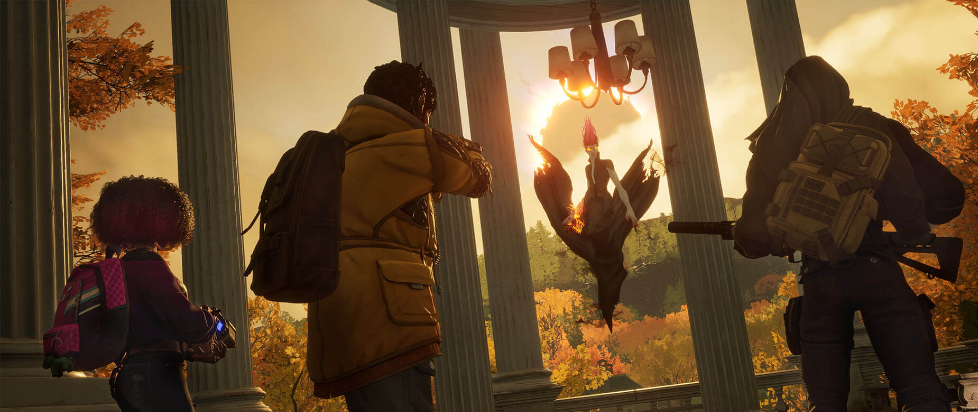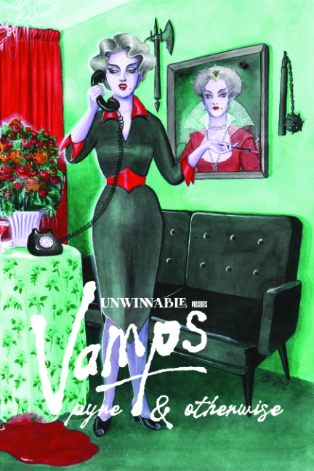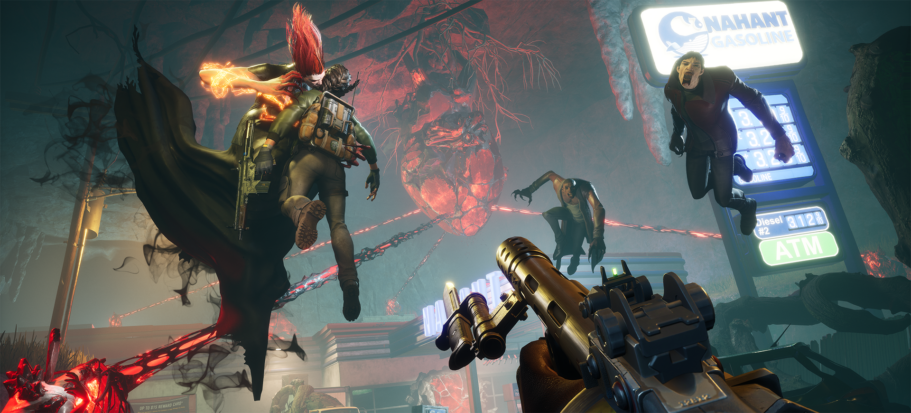
I Will Come Up With a Punny Title I Promise

This column is a reprint from Unwinnable Monthly #168. If you like what you see, grab the magazine for less than ten dollars, or subscribe and get all future magazines for half price.
———
Interfacing in the millennium.
———
Earlier this year, Arkane Studios released their highly-anticipated vampire hunting videogame Redfall. It did not do very well. The general consensus seems to have been that Arkane, who are best known for the Dishonored series, were out of their depth building a multiplayer shooter; based on the response to a recent leak regarding the possibility of a Dishonored 3, Redfall’s abrupt bombing seems to have been quickly and cleanly brushed under the rug. With any hope, Arkane will go back to what they’re good at (folks seem to be saying) and we can move past this unpleasant episode as quickly as possible.
Perhaps what doomed Redfall is that Arkane has a very strong house style. Generally, this is considered a good thing! Fans of the Dishonored series tend to be devotees, and Prey and Deathloop were seen as innovative experiments on the beloved – and functional – formula of a “classic Arkane game.” Redfall was not. Redfall borrowed from a very different playbook, the expansive space and infinite lists that we’re more used to seeing from Ubisoft. Redfall ended up as a game primarily about shooting very similar guns at very similar enemies while following a map marker to a waypoint. There was a story in there somewhere, and in Redfall’s defense the bones of that story were perfectly fine; city pulled out of time, vampiric menace hollowing it out, some loose critique of capitalism, some vague story about community coming together to rescue it all. There’s even a competent, and occasionally impressive, world to set it in – the receding waters of the bay and the massive waves cresting around the game world are genuinely beautiful and foreboding – but where the Dishonored games prioritized interesting interaction with their world above all else, Redfall makes it nothing but set decoration.
It wouldn’t have been as bad if it had just been an experiment that didn’t click. Games take risks all the time, and some work out better than others – sometimes a great game will go unappreciated by critics or be financially unsuccessful, and sometimes a game that’s honestly pretty mid will end up raking in the cash. It’s the specific type of uninventive that Redfall ended up being that was so disappointing. Everything that felt wrong about it was something we’ve seen before in the massive blockbusters that dominate the news cycles of gaming these days – the Far Crys, the Assassin’s Creeds, the Battlefields and Destinys. They didn’t try anything new at all, they did something that’s been done before, many times, and they did it worse. It points to a worrying instinct towards homogenization in games of this size, one that I would earlier have thought Arkane was free from.

I don’t think that it’s true that studios should only make one type of game. Simply saying that different studios should stick with what they’re good at discourages risk-taking and innovation. But I do think that somewhere along the way in Redfall’s development someone should have asked: What is this game, and why are we making it? That is the big unanswered question, for me, coming into Redfall from the rest of Arkane’s oeuvre. I simply don’t see the point of it.
It’s a shame to see a studio like Arkane release a game that feels so far removed from their usual modus operandi in such an uninteresting way. They’ve spent a decade releasing unique, interesting games with a strong individual design ethos, and then showed us a half-baked Far Cry copycat and expected it to land – something went very wrong there. I hope Redfall’s mistakes don’t dissuade other studios from taking risks or trying something new, but I do hope it shows them that what people want is not a blind embrace of bigger, quicker, more, but thoughtful and interesting evolutions of the lessons learned in earlier games.
The games industry feels like it’s expanding and contracting simultaneously. Games are getting exponentially more massive, companies are swelling in size, and at the same time the wideness and diversity of games seems to be narrowing. I’m compelled to clarify that this isn’t actually true: more people are making games than ever, and indie scenes are vibrant. But it’s not hard to see why it might feel that way! Small studios are getting swallowed and spit up, independent publishers are ballooning in size and goal until they bear little resemblance to what they were when they started. I have a feeling this is why Redfall’s mid-ness struck such a nerve; we saw a lively studio that makes beautiful games with the life sucked out of it, a cold bloodless shell of the games we used to love. Hopefully a fluke, on Arkane’s part. Hopefully just a small misstep. But unsettlingly close to an omen.
———
Maddi Chilton is an internet artifact from St. Louis, Missouri. Follow her on Twitter @allpalaces.




